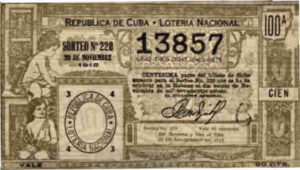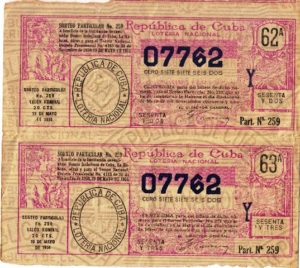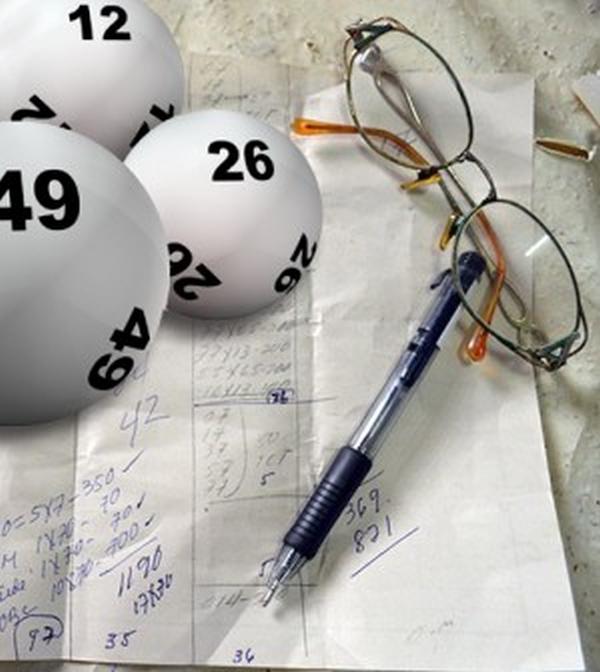 MEMORIES OF THE NATIONAL LOTTERY IN THE YEARS 50s IN CUBA.
MEMORIES OF THE NATIONAL LOTTERY IN THE YEARS 50s IN CUBA.
The lottery is a state monopoly or a concession regulated by law. In all countries there are prohibitions for individuals to organize lottery games that are not regulated in any way. A part of the proceeds from the sale of the lottery tickets in general is delivered to social welfare works or is in the hands of the State and is allocated to the current expenses of the same; hence, it is said that it is: “a voluntary tax for those who do not know mathematics”.
A 1957 statistic of what Cubans invested every year in lottery tickets, verses of the charade and hundreds and terminals of the ball, points a fluctuating figure between $ 90 and $ 100 million, a considerable figure at that time.
The Lottery in Cuba is illegal, since the triumph of the revolution, but it has not stopped playing behind the government’s back, because it is the Cuban people, very dreamer and with illusions. Many think that the Cuban lottery is also a popular tradition, because on the Island, despite being illegal, many know the meaning of the numbers of the charade. And there we go with an inevitable vice of the Cuban.
In Cuba the charade is a table composed of 100 consecutive numbers from 1 to 100. The first 36 numbers are taken from the so-called Chinese charade or chiffita, the rest are products of the popular imagination. In Cuba they usually ask: What did you dream last night? Then the dreams were related to the numbers of the charade and this serves as a cabal to play the lottery or the “little ball”. For example, if a person dreamed of a cat, ran and pointed to the number 4. A mouse was put into the house, then people played mouse that is 29. In the carnival people always played the 67 = Puñalá.
Our bus drivers and taxi driver always had a privileged number in our charade 82 = Mother. This was because people always reminded him of his loved one, because the guagüeros (bus drivers) and the taxi drivers are from Madre.
And so, people were associating objects with numbers to the point that by the characteristics of people sometimes called by a number or in a conversation instead of a word was used a number for example:
-They left him on the 7th! (ass)
-Poor so-and-so moved to 14 (cemetery).
On December 17 is San Lazaro, that day everyone played on the 17th, of course that day did not come on the 17th for anything in the world.
 RECUERDOS DE LA LOTERÍA NACIONAL EN LOS AÑOS 50s EN CUBA.
RECUERDOS DE LA LOTERÍA NACIONAL EN LOS AÑOS 50s EN CUBA.
La lotería es un monopolio estatal o una concesión regulada por la leyes. En todos los países existen prohibiciones para que los particulares organicen juegos de lotería que no estén regulados de alguna forma. Una parte de lo recaudado por la venta de los billetes de lotería en general es entregada a obras de beneficencia social o queda en manos del Estado y es destinado a los gastos corrientes del mismo; de ahí que se diga que se trata de: “un impuesto voluntario para el que no sabe matemáticas”.
Una estadística de 1957 de lo que invertían los cubanos todos los años en billetes de lotería, versos de la charada y centenas y terminales de la bolita, apunta una cifra fluctuante entre los $90 y los $100 millones, cifra considerable en aquellos momentos.
La Lotería en Cuba es ilegal, desde el triunfo de la revolución, pero no ha dejado de jugarse a espaldas del gobierno, porque es el pueblo cubano muy soñador y con ilusiones. Muchos piensan que es la lotería cubana también es una tradición popular, porque en la Isla a pesar de ser ilegal muchos conocen el significado de los números de la charada. Y ahí vamos con un vicio inevitable del cubano.
En Cuba la charada es una tabla compuesta de 100 números consecutivos del 1 al 100. Los primeros 36 números están tomados de la llamada charada china o chiffá, los restantes son producto de la imaginación popular. En Cuba suelen preguntar: ¿Qué soñaste anoche?. Entonces se relacionaba los sueños con los números de la charada y esto sirven de cábala para jugar a la lotería o la “bolita”. Por ejemplo, si una persona soñaba con un gato, corría y apuntaba el numero 4. Se metía un ratón a la casa, entonces la gente jugaba ratón que es el 29. En los carnavales siempre la gente jugaba el 67=Puñalá.
Nuestros guagüeros y taxista siempre tenían un numero privilegiado en nuestra charada 82=Madre. Esto se debía a que la gente siempre le recordaban el ser querido, porque los guagüeros (conductores de ómnibus) y los taxistas son de Madre.
Y así, la gente fue asociando objetos con números al punto que por las características de las personas a veces se le llamaba por un numero o en una conversación en lugar de una palabra se utilizaba un número por ejemplo:
-Le partieron el 7! (culo)
-Pobre fulano se mudó para el 14 (cementerio).
El 17 de diciembre es San Lázaro, ese día todo el mundo jugaba el 17, claro que ese día no salía el 17 por nada del mundo.
Agencies/Recuerdos Cubanos/Internet Photos/ Arnoldo Varona/ TheCubanHistory.com
THE CUBAN HISTORY, HOLLYWOOD.







